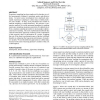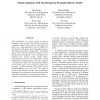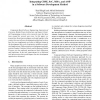467 search results - page 49 / 94 » Modelling Context: An Activity Theory Approach |
INFSOF
2007
13 years 7 months ago
2007
This paper presents a framework that draws on Structuration theory and dialectical hermeneutics to explicate the dynamics of software process improvement (SPI) in a packaged softw...
CHI
2008
ACM
14 years 8 months ago
2008
ACM
Experience sampling has been employed for decades to collect assessments of subjects' intentions, needs, and affective states. In recent years, investigators have employed au...
QSIC
2008
IEEE
14 years 2 months ago
2008
IEEE
Fault localization is a major activity in software debugging. Many existing statistical fault localization techniques compare feature spectra of successful and failed runs. Some a...
NN
2006
Springer
13 years 7 months ago
2006
Springer
The medial temporal lobe may play a critical role in binding successive events into memory while encoding contextual information in implicit and explicit memory tasks. Information...
EDOC
2003
IEEE
14 years 27 days ago
2003
IEEE
Component-Based Software Engineering, Separation of Concerns, Model-Driven Architecture, and Aspect-Oriented Programming are four active research areas that have been around for s...



